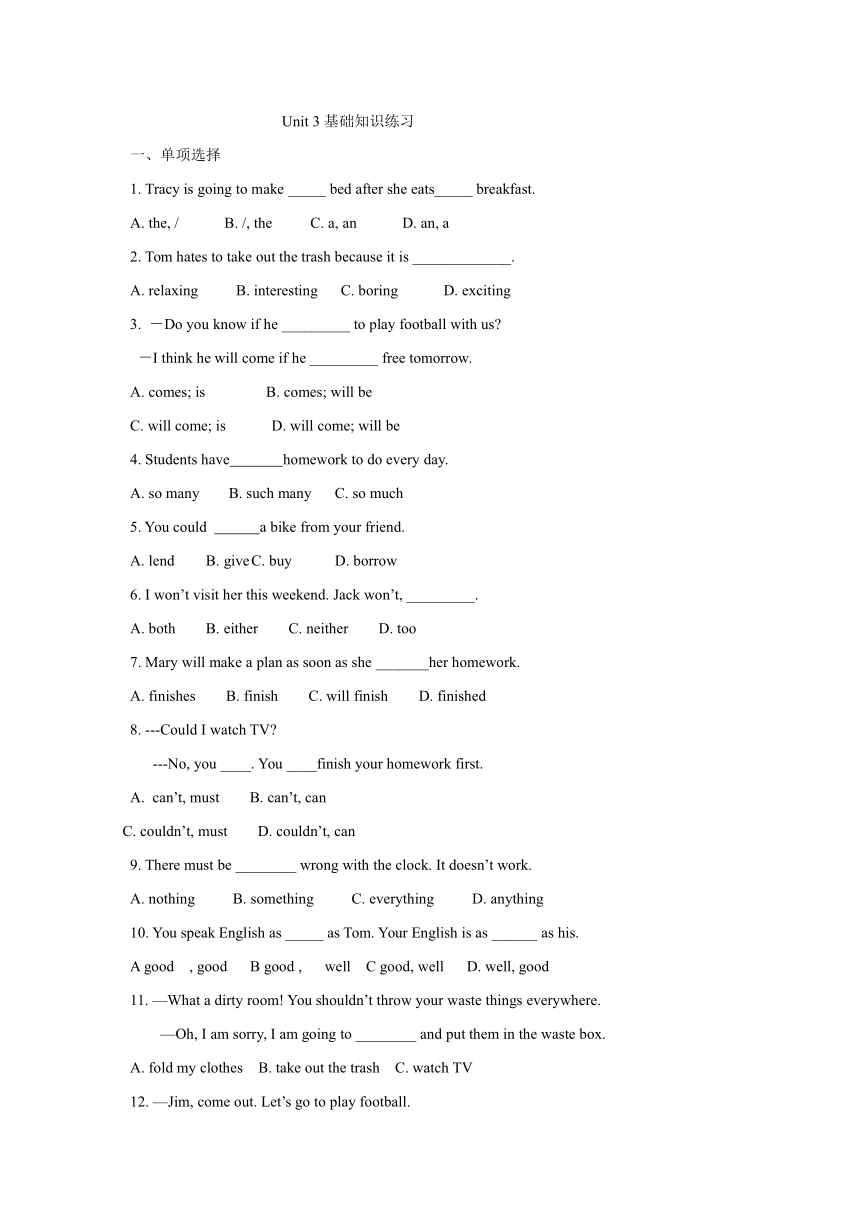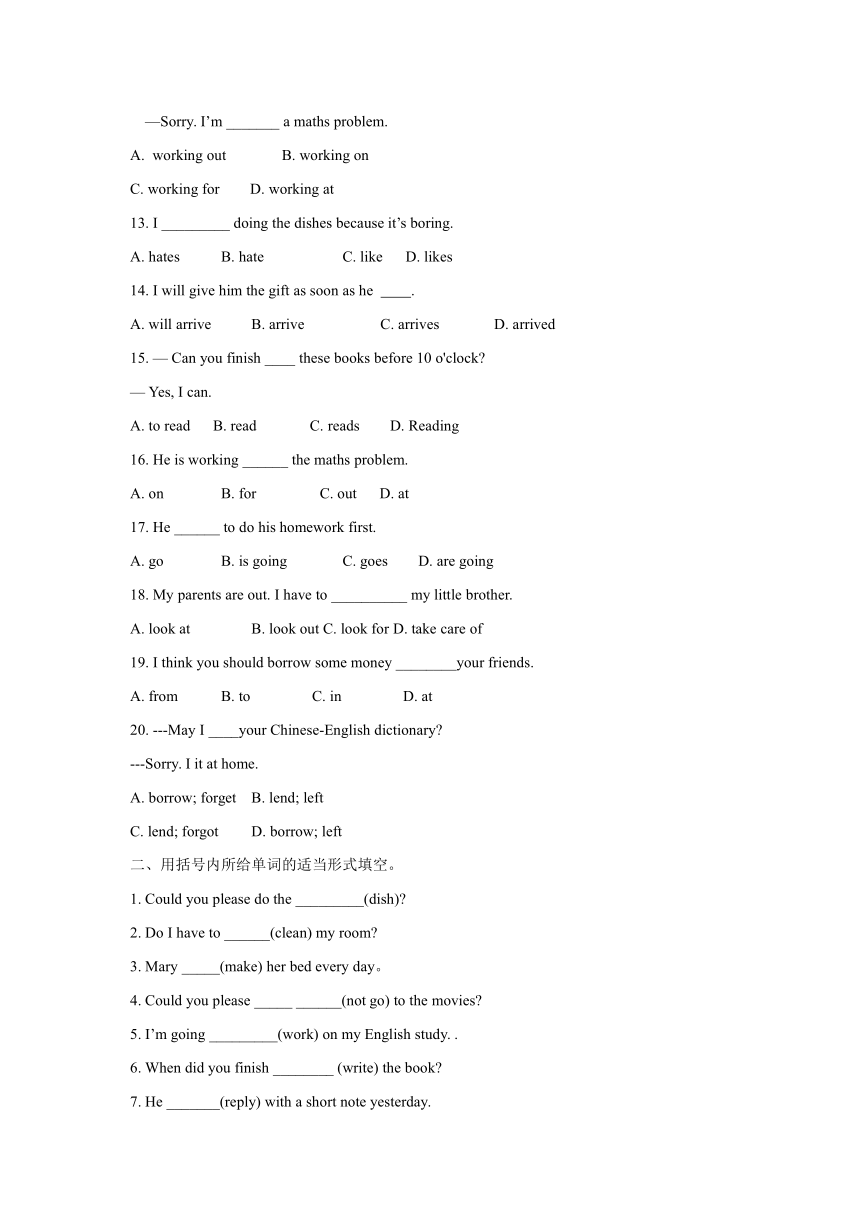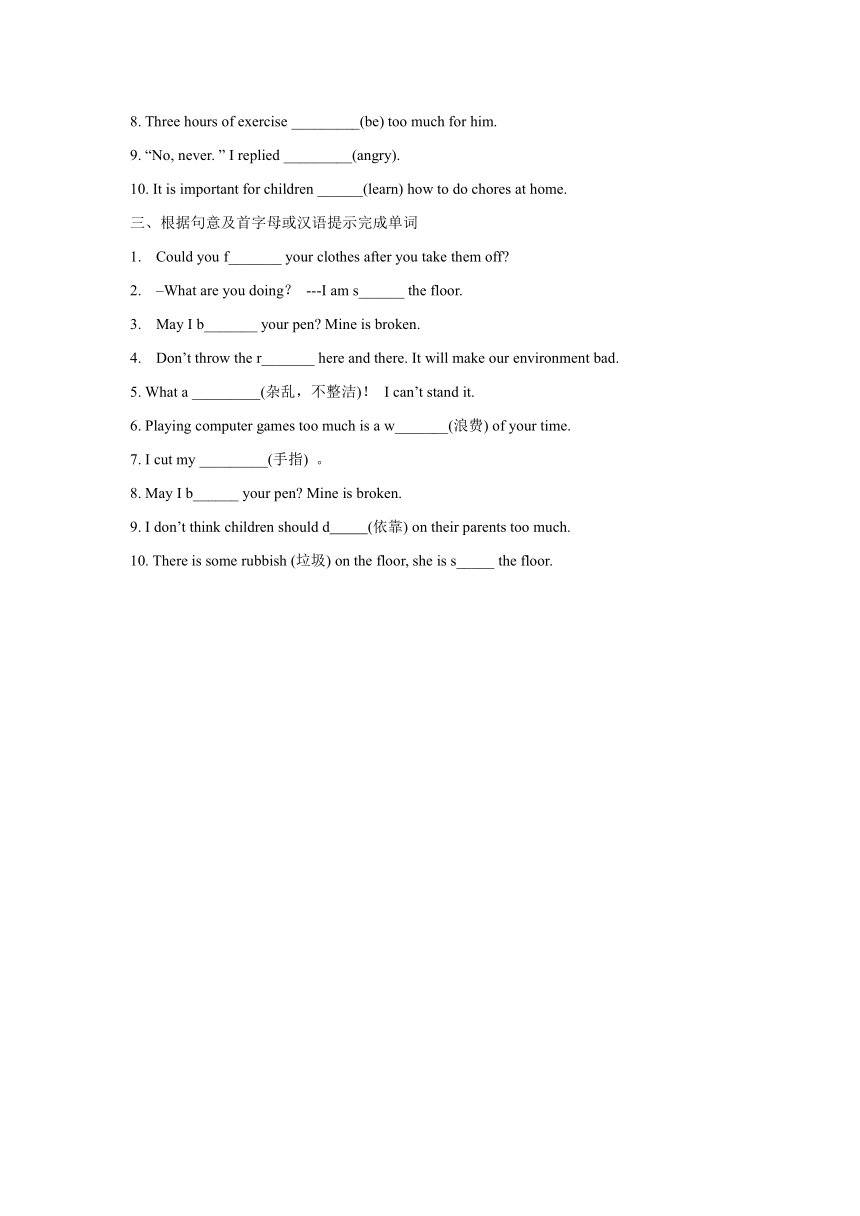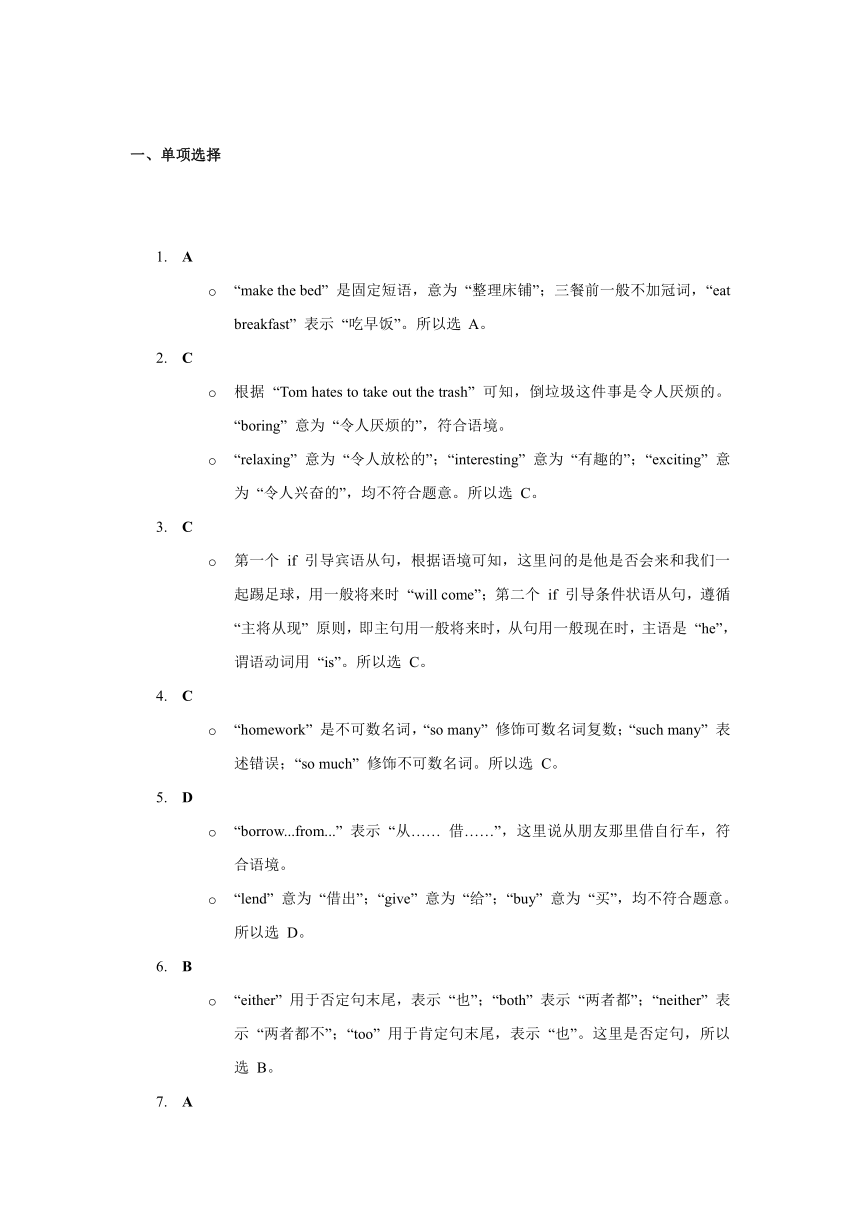Unit 3 Could you please clean your room?基础知识练习(含解析)2024-2025学年人教版八年级英语下册
文档属性
| 名称 | Unit 3 Could you please clean your room?基础知识练习(含解析)2024-2025学年人教版八年级英语下册 |

|
|
| 格式 | docx | ||
| 文件大小 | 26.1KB | ||
| 资源类型 | 教案 | ||
| 版本资源 | 人教新目标(Go for it)版 | ||
| 科目 | 英语 | ||
| 更新时间 | 2025-02-25 00:00:00 | ||
图片预览




文档简介
Unit 3基础知识练习
一、单项选择
1. Tracy is going to make _____ bed after she eats_____ breakfast.
A. the, / B. /, the C. a, an D. an, a
2. Tom hates to take out the trash because it is _____________.
A. relaxing B. interesting C. boring D. exciting
3. -Do you know if he _________ to play football with us
-I think he will come if he _________ free tomorrow.
A. comes; is B. comes; will be
C. will come; is D. will come; will be
4. Students have homework to do every day.
A. so many B. such many C. so much
5. You could a bike from your friend.
A. lend B. give C. buy D. borrow
6. I won’t visit her this weekend. Jack won’t, _________.
A. both B. either C. neither D. too
7. Mary will make a plan as soon as she _______her homework.
A. finishes B. finish C. will finish D. finished
8. ---Could I watch TV
---No, you ____. You ____finish your homework first.
can’t, must B. can’t, can
C. couldn’t, must D. couldn’t, can
9. There must be ________ wrong with the clock. It doesn’t work.
A. nothing B. something C. everything D. anything
10. You speak English as _____ as Tom. Your English is as ______ as his.
A good , good B good , well C good, well D. well, good
11. —What a dirty room! You shouldn’t throw your waste things everywhere.
—Oh, I am sorry, I am going to ________ and put them in the waste box.
A. fold my clothes B. take out the trash C. watch TV
12. —Jim, come out. Let’s go to play football.
—Sorry. I’m _______ a maths problem.
working out B. working on
C. working for D. working at
13. I _________ doing the dishes because it’s boring.
A. hates B. hate C. like D. likes
14. I will give him the gift as soon as he .
A. will arrive B. arrive C. arrives D. arrived
15. — Can you finish ____ these books before 10 o'clock
— Yes, I can.
A. to read B. read C. reads D. Reading
16. He is working ______ the maths problem.
A. on B. for C. out D. at
17. He ______ to do his homework first.
A. go B. is going C. goes D. are going
18. My parents are out. I have to __________ my little brother.
A. look at B. look out C. look for D. take care of
19. I think you should borrow some money ________your friends.
A. from B. to C. in D. at
20. ---May I ____your Chinese-English dictionary
---Sorry. I it at home.
A. borrow; forget B. lend; left
C. lend; forgot D. borrow; left
二、用括号内所给单词的适当形式填空。
1. Could you please do the _________(dish)
2. Do I have to ______(clean) my room
3. Mary _____(make) her bed every day。
4. Could you please _____ ______(not go) to the movies
5. I’m going _________(work) on my English study. .
6. When did you finish ________ (write) the book
7. He _______(reply) with a short note yesterday.
8. Three hours of exercise _________(be) too much for him.
9. “No, never. ” I replied _________(angry).
10. It is important for children ______(learn) how to do chores at home.
三、根据句意及首字母或汉语提示完成单词
Could you f_______ your clothes after you take them off
–What are you doing? ---I am s______ the floor.
May I b_______ your pen Mine is broken.
Don’t throw the r_______ here and there. It will make our environment bad.
5. What a _________(杂乱,不整洁)! I can’t stand it.
6. Playing computer games too much is a w_______(浪费) of your time.
7. I cut my _________(手指) 。
8. May I b______ your pen Mine is broken.
9. I don’t think children should d (依靠) on their parents too much.
10. There is some rubbish (垃圾) on the floor, she is s_____ the floor.
一、单项选择
A
“make the bed” 是固定短语,意为 “整理床铺”;三餐前一般不加冠词,“eat breakfast” 表示 “吃早饭”。所以选 A。
C
根据 “Tom hates to take out the trash” 可知,倒垃圾这件事是令人厌烦的。“boring” 意为 “令人厌烦的”,符合语境。
“relaxing” 意为 “令人放松的”;“interesting” 意为 “有趣的”;“exciting” 意为 “令人兴奋的”,均不符合题意。所以选 C。
C
第一个 if 引导宾语从句,根据语境可知,这里问的是他是否会来和我们一起踢足球,用一般将来时 “will come”;第二个 if 引导条件状语从句,遵循 “主将从现” 原则,即主句用一般将来时,从句用一般现在时,主语是 “he”,谓语动词用 “is”。所以选 C。
C
“homework” 是不可数名词,“so many” 修饰可数名词复数;“such many” 表述错误;“so much” 修饰不可数名词。所以选 C。
D
“borrow...from...” 表示 “从…… 借……”,这里说从朋友那里借自行车,符合语境。
“lend” 意为 “借出”;“give” 意为 “给”;“buy” 意为 “买”,均不符合题意。所以选 D。
B
“either” 用于否定句末尾,表示 “也”;“both” 表示 “两者都”;“neither” 表示 “两者都不”;“too” 用于肯定句末尾,表示 “也”。这里是否定句,所以选 B。
A
“as soon as” 引导时间状语从句,遵循 “主将从现” 原则,主语是 “she”,谓语动词用 “finishes”。所以选 A。
A
“Could I... ” 表示委婉请求,否定回答用 “can’t”;“must” 表示 “必须”,这里说必须先完成作业,符合语境。所以选 A。
B
“There is something wrong with...” 表示 “…… 出问题了”,根据 “It doesn’t work.” 可知,时钟出问题了,所以选 B。
D
第一个空修饰动词 “speak”,要用副词 “well”;第二个空在 “is” 后面作表语,要用形容词 “good”。所以选 D。
B
“take out the trash” 表示 “倒垃圾”,根据前文说不要到处扔垃圾,可知这里是要把垃圾捡起来倒掉,符合语境。
“fold my clothes” 表示 “叠我的衣服”;“watch TV” 表示 “看电视”,均不符合题意。所以选 B。
B
“work on” 表示 “致力于;从事”,这里说正在解决一道数学题,符合语境。
“work out” 表示 “算出;解决(问题)”,但一般不强调正在进行的状态;“work for” 表示 “为…… 工作”;“work at” 表示 “在…… 方面努力”,均不符合题意。所以选 B。
B
根据 “because it’s boring” 可知,“我” 讨厌洗碗,“I” 是第一人称,动词用原形 “hate”。所以选 B。
C
“as soon as” 引导时间状语从句,遵循 “主将从现” 原则,主语 “he” 是第三人称单数,谓语动词用 “arrives”。所以选 C。
D
“finish doing sth.” 表示 “完成做某事”,所以用 “read” 的动名词 “reading”。所以选 D。
A
“work on” 表示 “致力于;从事”,“work on the maths problem” 表示 “解决这道数学题”,所以选 A。
B
“be going to do sth.” 表示 “打算做某事”,主语 “He” 是第三人称单数,be 动词用 “is”。所以选 B。
D
“take care of” 表示 “照顾”,这里说父母不在家,“我” 要照顾弟弟,符合语境。
“look at” 表示 “看”;“look out” 表示 “小心”;“look for” 表示 “寻找”,均不符合题意。所以选 D。
A
“borrow...from...” 表示 “从…… 借……”,所以选 A。
D
“borrow” 表示 “借入”;“leave sth. + 地点” 表示 “把某物落在某地”,这里说把字典落在家里,用 “left”。所以选 D。
二、用括号内所给单词的适当形式填空
dishes
“do the dishes” 是固定短语,意为 “洗碗”,所以用 “dish” 的复数 “dishes”。
clean
“have to do sth.” 表示 “不得不做某事”,所以用动词原形 “clean”。
makes
根据 “every day” 可知,该句时态是一般现在时,主语 “Mary” 是第三人称单数,动词用 “makes”。
not go
“Could you please not do sth.” 表示 “请你不要做某事好吗”,所以填 “not go”。
to work
“be going to do sth.” 表示 “打算做某事”,所以用 “to work”。
writing
“finish doing sth.” 表示 “完成做某事”,所以用 “write” 的动名词 “writing”。
replied
根据 “yesterday” 可知,该句时态是一般过去时,“reply” 的过去式是 “replied”。
is
“Three hours of exercise” 表示一段时间,作主语时,谓语动词用单数形式 “is”。
angrily
修饰动词 “replied” 要用副词,“angry” 的副词是 “angrily”。
to learn
“It is + 形容词 + for sb. + to do sth.” 是固定句型,其中 “it” 是形式主语,真正的主语是后面的动词不定式,所以用 “to learn”。
三、根据句意及首字母或汉语提示完成单词
fold
“fold clothes” 表示 “叠衣服”,“Could you... ” 后面接动词原形,所以填 “fold”。
sweeping
“sweep the floor” 表示 “扫地”,根据问句 “What are you doing ” 可知,该句时态是现在进行时,结构是 “be + 动词的现在分词”,所以填 “sweeping”。
borrow
“borrow” 表示 “借入”,“May I... ” 后面接动词原形,所以填 “borrow”。
rubbish
“rubbish” 是不可数名词,意为 “垃圾”,所以填 “rubbish”。
mess
“What a mess!” 表示 “真是一团糟!”,所以填 “mess”。
waste
“a waste of time” 表示 “浪费时间”,所以填 “waste”。
finger
“finger” 意为 “手指”,这里指割伤了一根手指,用单数形式,所以填 “finger”。
borrow
同第 3 题,“May I... ” 后面接动词原形,“borrow” 表示 “借入”,所以填 “borrow”。
depend
“depend on” 表示 “依靠”,“should” 是情态动词,后面接动词原形,所以填 “depend”。
sweeping
“sweep the floor” 表示 “扫地”,根据前面说地上有垃圾,可知她正在扫地,用现在进行时,结构是 “be + 动词的现在分词”,所以填 “sweeping”。
一、单项选择
1. Tracy is going to make _____ bed after she eats_____ breakfast.
A. the, / B. /, the C. a, an D. an, a
2. Tom hates to take out the trash because it is _____________.
A. relaxing B. interesting C. boring D. exciting
3. -Do you know if he _________ to play football with us
-I think he will come if he _________ free tomorrow.
A. comes; is B. comes; will be
C. will come; is D. will come; will be
4. Students have homework to do every day.
A. so many B. such many C. so much
5. You could a bike from your friend.
A. lend B. give C. buy D. borrow
6. I won’t visit her this weekend. Jack won’t, _________.
A. both B. either C. neither D. too
7. Mary will make a plan as soon as she _______her homework.
A. finishes B. finish C. will finish D. finished
8. ---Could I watch TV
---No, you ____. You ____finish your homework first.
can’t, must B. can’t, can
C. couldn’t, must D. couldn’t, can
9. There must be ________ wrong with the clock. It doesn’t work.
A. nothing B. something C. everything D. anything
10. You speak English as _____ as Tom. Your English is as ______ as his.
A good , good B good , well C good, well D. well, good
11. —What a dirty room! You shouldn’t throw your waste things everywhere.
—Oh, I am sorry, I am going to ________ and put them in the waste box.
A. fold my clothes B. take out the trash C. watch TV
12. —Jim, come out. Let’s go to play football.
—Sorry. I’m _______ a maths problem.
working out B. working on
C. working for D. working at
13. I _________ doing the dishes because it’s boring.
A. hates B. hate C. like D. likes
14. I will give him the gift as soon as he .
A. will arrive B. arrive C. arrives D. arrived
15. — Can you finish ____ these books before 10 o'clock
— Yes, I can.
A. to read B. read C. reads D. Reading
16. He is working ______ the maths problem.
A. on B. for C. out D. at
17. He ______ to do his homework first.
A. go B. is going C. goes D. are going
18. My parents are out. I have to __________ my little brother.
A. look at B. look out C. look for D. take care of
19. I think you should borrow some money ________your friends.
A. from B. to C. in D. at
20. ---May I ____your Chinese-English dictionary
---Sorry. I it at home.
A. borrow; forget B. lend; left
C. lend; forgot D. borrow; left
二、用括号内所给单词的适当形式填空。
1. Could you please do the _________(dish)
2. Do I have to ______(clean) my room
3. Mary _____(make) her bed every day。
4. Could you please _____ ______(not go) to the movies
5. I’m going _________(work) on my English study. .
6. When did you finish ________ (write) the book
7. He _______(reply) with a short note yesterday.
8. Three hours of exercise _________(be) too much for him.
9. “No, never. ” I replied _________(angry).
10. It is important for children ______(learn) how to do chores at home.
三、根据句意及首字母或汉语提示完成单词
Could you f_______ your clothes after you take them off
–What are you doing? ---I am s______ the floor.
May I b_______ your pen Mine is broken.
Don’t throw the r_______ here and there. It will make our environment bad.
5. What a _________(杂乱,不整洁)! I can’t stand it.
6. Playing computer games too much is a w_______(浪费) of your time.
7. I cut my _________(手指) 。
8. May I b______ your pen Mine is broken.
9. I don’t think children should d (依靠) on their parents too much.
10. There is some rubbish (垃圾) on the floor, she is s_____ the floor.
一、单项选择
A
“make the bed” 是固定短语,意为 “整理床铺”;三餐前一般不加冠词,“eat breakfast” 表示 “吃早饭”。所以选 A。
C
根据 “Tom hates to take out the trash” 可知,倒垃圾这件事是令人厌烦的。“boring” 意为 “令人厌烦的”,符合语境。
“relaxing” 意为 “令人放松的”;“interesting” 意为 “有趣的”;“exciting” 意为 “令人兴奋的”,均不符合题意。所以选 C。
C
第一个 if 引导宾语从句,根据语境可知,这里问的是他是否会来和我们一起踢足球,用一般将来时 “will come”;第二个 if 引导条件状语从句,遵循 “主将从现” 原则,即主句用一般将来时,从句用一般现在时,主语是 “he”,谓语动词用 “is”。所以选 C。
C
“homework” 是不可数名词,“so many” 修饰可数名词复数;“such many” 表述错误;“so much” 修饰不可数名词。所以选 C。
D
“borrow...from...” 表示 “从…… 借……”,这里说从朋友那里借自行车,符合语境。
“lend” 意为 “借出”;“give” 意为 “给”;“buy” 意为 “买”,均不符合题意。所以选 D。
B
“either” 用于否定句末尾,表示 “也”;“both” 表示 “两者都”;“neither” 表示 “两者都不”;“too” 用于肯定句末尾,表示 “也”。这里是否定句,所以选 B。
A
“as soon as” 引导时间状语从句,遵循 “主将从现” 原则,主语是 “she”,谓语动词用 “finishes”。所以选 A。
A
“Could I... ” 表示委婉请求,否定回答用 “can’t”;“must” 表示 “必须”,这里说必须先完成作业,符合语境。所以选 A。
B
“There is something wrong with...” 表示 “…… 出问题了”,根据 “It doesn’t work.” 可知,时钟出问题了,所以选 B。
D
第一个空修饰动词 “speak”,要用副词 “well”;第二个空在 “is” 后面作表语,要用形容词 “good”。所以选 D。
B
“take out the trash” 表示 “倒垃圾”,根据前文说不要到处扔垃圾,可知这里是要把垃圾捡起来倒掉,符合语境。
“fold my clothes” 表示 “叠我的衣服”;“watch TV” 表示 “看电视”,均不符合题意。所以选 B。
B
“work on” 表示 “致力于;从事”,这里说正在解决一道数学题,符合语境。
“work out” 表示 “算出;解决(问题)”,但一般不强调正在进行的状态;“work for” 表示 “为…… 工作”;“work at” 表示 “在…… 方面努力”,均不符合题意。所以选 B。
B
根据 “because it’s boring” 可知,“我” 讨厌洗碗,“I” 是第一人称,动词用原形 “hate”。所以选 B。
C
“as soon as” 引导时间状语从句,遵循 “主将从现” 原则,主语 “he” 是第三人称单数,谓语动词用 “arrives”。所以选 C。
D
“finish doing sth.” 表示 “完成做某事”,所以用 “read” 的动名词 “reading”。所以选 D。
A
“work on” 表示 “致力于;从事”,“work on the maths problem” 表示 “解决这道数学题”,所以选 A。
B
“be going to do sth.” 表示 “打算做某事”,主语 “He” 是第三人称单数,be 动词用 “is”。所以选 B。
D
“take care of” 表示 “照顾”,这里说父母不在家,“我” 要照顾弟弟,符合语境。
“look at” 表示 “看”;“look out” 表示 “小心”;“look for” 表示 “寻找”,均不符合题意。所以选 D。
A
“borrow...from...” 表示 “从…… 借……”,所以选 A。
D
“borrow” 表示 “借入”;“leave sth. + 地点” 表示 “把某物落在某地”,这里说把字典落在家里,用 “left”。所以选 D。
二、用括号内所给单词的适当形式填空
dishes
“do the dishes” 是固定短语,意为 “洗碗”,所以用 “dish” 的复数 “dishes”。
clean
“have to do sth.” 表示 “不得不做某事”,所以用动词原形 “clean”。
makes
根据 “every day” 可知,该句时态是一般现在时,主语 “Mary” 是第三人称单数,动词用 “makes”。
not go
“Could you please not do sth.” 表示 “请你不要做某事好吗”,所以填 “not go”。
to work
“be going to do sth.” 表示 “打算做某事”,所以用 “to work”。
writing
“finish doing sth.” 表示 “完成做某事”,所以用 “write” 的动名词 “writing”。
replied
根据 “yesterday” 可知,该句时态是一般过去时,“reply” 的过去式是 “replied”。
is
“Three hours of exercise” 表示一段时间,作主语时,谓语动词用单数形式 “is”。
angrily
修饰动词 “replied” 要用副词,“angry” 的副词是 “angrily”。
to learn
“It is + 形容词 + for sb. + to do sth.” 是固定句型,其中 “it” 是形式主语,真正的主语是后面的动词不定式,所以用 “to learn”。
三、根据句意及首字母或汉语提示完成单词
fold
“fold clothes” 表示 “叠衣服”,“Could you... ” 后面接动词原形,所以填 “fold”。
sweeping
“sweep the floor” 表示 “扫地”,根据问句 “What are you doing ” 可知,该句时态是现在进行时,结构是 “be + 动词的现在分词”,所以填 “sweeping”。
borrow
“borrow” 表示 “借入”,“May I... ” 后面接动词原形,所以填 “borrow”。
rubbish
“rubbish” 是不可数名词,意为 “垃圾”,所以填 “rubbish”。
mess
“What a mess!” 表示 “真是一团糟!”,所以填 “mess”。
waste
“a waste of time” 表示 “浪费时间”,所以填 “waste”。
finger
“finger” 意为 “手指”,这里指割伤了一根手指,用单数形式,所以填 “finger”。
borrow
同第 3 题,“May I... ” 后面接动词原形,“borrow” 表示 “借入”,所以填 “borrow”。
depend
“depend on” 表示 “依靠”,“should” 是情态动词,后面接动词原形,所以填 “depend”。
sweeping
“sweep the floor” 表示 “扫地”,根据前面说地上有垃圾,可知她正在扫地,用现在进行时,结构是 “be + 动词的现在分词”,所以填 “sweeping”。
同课章节目录
- Unit 1 What's the matter?
- Section A
- Section B
- Unit 2 I'll help to clean up the city parks.
- Section A
- Section B
- Unit 3 Could you please clean your room?
- Section A
- Section B
- Unit 4 Why don't you talk to your parents?
- Section A
- Section B
- Unit 5 What were you doing when the rainstorm came
- Section A
- Section B
- Review of Units 1-5
- Unit 6 An old man tried to move the mountains.
- Section A
- Section B
- Unit 7 What's the highest mountain in the world?
- Section A
- Section B
- Unit 8 Have you read Treasure Island yet?
- Section A
- Section B
- Unit 9 Have you ever been to a museum?
- Section A
- Section B
- Unit 10 I've had this bike for three years.
- Section A
- Section B
